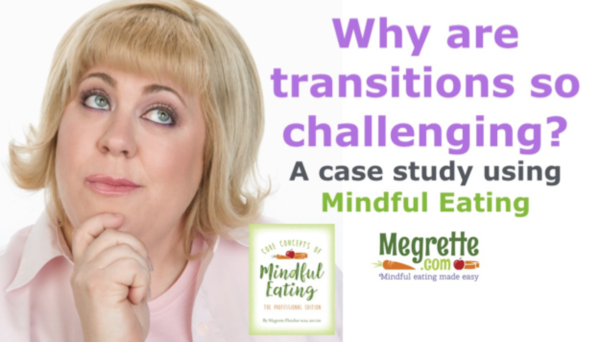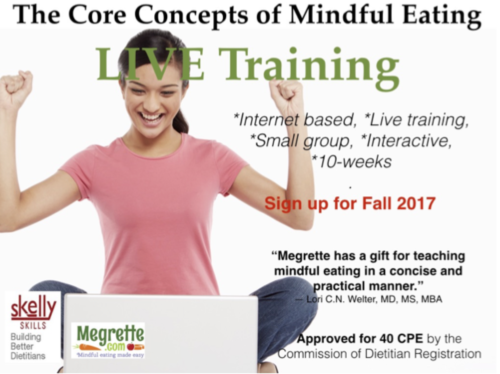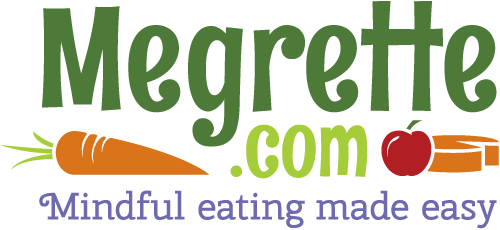Transitions are the places mindless eating happens for many people, myself included. The ‘call of the cookie’ seems loudest in the lull before a project begins or after its completion. Transitions are places where the mind leaves the present moment, naturally, to consider a future task or to reflect on a past event. This transition creates moments of anxiety or distraction where reflex, conditioning, and old habits re-emerge.
Leaving work at the end of the day is a common place of transition. The typical end of day transition often contains fatigue, hunger, and temptations on the road home. Helping your clients non-judgmentally recognize transitions is challenging and is the ideal place to begin discussing mindful eating.

You might begin by asking an open-ended statement, such as, “Walk me through what happens on your way home from work?” or “What helps you eat a balanced meal after working a long day?”
There are many behavioral triggers which occur at the end of the day, and just like Pavlov’s dogs and his experiment explaining classical conditioning, you also can train yourself to salivate in anticipation of a delicious treat when certain conditions are present. These may include:
- Entering the house/home
- Leaving work (and the desire to go to a drive thru or to purchase dinner instead of cooking a meal)
- Ending a meal (and the desire for dessert)
- Before bed (and the desire for a snack)
- Before or after exercise/activity
- Starting a new project or task
- Before meeting a friend/client/patient
These habits are the conditioning of an eating behavior associated with a specific transition or event. Mindfulness provides your client with both the awareness of the behavioral transition and the opportunity to associate a new behavior with the transition.
Case Study — Tyler and the Drive-Thru
Tyler is a 30-year old man who has just begun a new business. He was also just informed his blood sugar wasn’t normal (Pre-diabetes) and he would like to establish healthier eating habits.
Counselor: “Thank you, Tyler, for explaining the situation and your desire to improve your blood sugar and eat healthier. Can you tell me about the days when you eat more balanced meals?”
Tyler: “I think that happens most when I have a meal already prepared. When I am running late or work was frustrating I just go to the drive-thru.”
Counselor: “What would be an example of a meal that is already prepared?”
Tyler: “Oh, I bought one of those roaster chickens and made some chicken salad for dinner yesterday. I had the chicken salad with mixed greens, and it was pretty healthy.”
Counselor: “Describe your level of hunger when you get home from work.”
Tyler: “Like I said, If I am running late, I will just buy something at the drive-thru.”
Counselor: “Because you are too hungry to cook a meal?”
Tyler: “Actually, no – but because I am too lazy.”
Counselor: “After work you want something easy because starting a new business is difficult, so the desire for ease is prompting you to go through the drive-thru.”
Tyler: “Yes, that is so true! I hadn’t even thought of the mental or emotional fatigue which is part of starting a business. But you are right. I also think I am hungry.
Counselor: “You hadn’t thought of your hunger as being part of your desire to hit the drive-thru.”
Tyler: “No, I just assumed I was being lazy.”
Counselor: “There are a lot of reasons why the drive-thru is so appealing!”
Tyler: “Yes, I guess there are.”
Counselor: “Are the drive-thru food choices helping your health?”
Tyler: “I wish! Trust me; I eat crap when I hit the drive-thru! I need to break this habit.”
Counselor: “After a long day, when you are hungry, and if you don’t have something made at home, you are pulled into your unhelpful habit of using the drive-thru for dinner. And it happens, even though you know you can make healthier choices that would better serve you if you had food at home.”
Tyler: “Yep, that is a great summary but I want to work on figuring this out.”
Transitions are often busy places, filled with old habits and multiple reasons to make and repeat choices. Using your exceptional counseling skills, you can pull out the many reasons your client is making particular choices. Helping your client notice the complexity of his food and eating choices with empathy can also assist him let go of emotionally triggering labels like “Lazy” or “Unable.” Additionally, you may need to slow down the counseling session to untangle the factors not supporting the desired, health supporting habits. This can be done by using open ended questions, creating short but clear reflections and offering a short summary of the client’s conflict or desire.

The Core Concepts of Mindful Eating: Professional Edition offers dietitians and health professionals a way to see the big picture of Mindful Eating and can sharpen your motivational interviewing counseling skills. If you are looking to deepen your understanding of Mindful Eating, The Core Concepts of Mindful Eating LIVE Training starts September 13 and runs thru November 15, 2017. You can even save $50 by enrolling in July!
Stay tuned as we continue to explore the theme of transitions. The next post will examine the benefits of a change, so sign up for Mindful Eating Made Easy Counseling Blog today!

